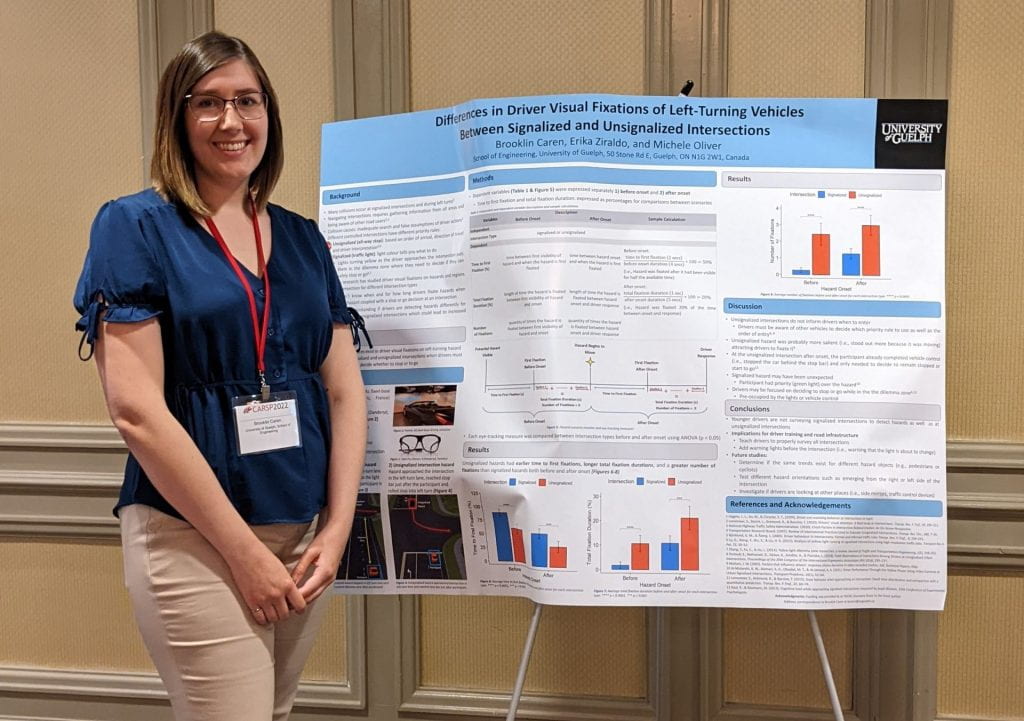Are you interested in joining the lab? Here’s how…
We are always looking for students in the lab, either at the graduate level (Masters and PhD students) or the undergraduate level. In our lab, we fully support the principles of equity, diversity, and inclusiveness. Everyone is welcome! Moreover, our lab is multi-disciplinary, with students from Psychology, Neuroscience, Computer Science, and Engineering, though the way that you join the lab will vary depending on your situation, as described below.




Award winning students from our lab (Top to bottom left, and then right): Robert Ramkhalawansigh: Canadian Psychological Association thesis award; Alexandra Mueller: Canadian Psychological Association thesis award and the Honda Outstanding Student Paper Award at Driving Assessment; Rebecca Reed Jones (in collaboration with James Reed Jones): Honda Outstanding Student Paper Award at Driving Assessment and Best Biomechanics Paper at the Ontario Biomechanics conference; Danielle Filio: Runner up for Honda Outstanding Student Paper Award at Driving Assessment.
Graduate Students
Psychology or Neuroscience students: To join our lab at the Masters or PhD level, apply through the website for the Neuroscience and Applied Cognitive Science area (NACS), which is an area of study within the Psychology Department at the University of Guelph. A background in research methods and statistics, human factors, sensation and perception, cognitive psychology, or cognitive neuroscience is an asset for working in the lab.
Information on how to apply, requirements, deadlines, and specifics about the program can be found here:
Graduate program in Neuroscience and Applied Cognitive Science
Please contact Dr. Lana Trick (ltrick@uoguelph.ca) if you are interested in applying to graduate school through Psychology or Neuroscience.

Computer Science students. To join our lab at the Masters or PhD level through Computer Science, the easiest way is to apply through the website for the School of Computer Science for a thesis based degree. A background in either machine learning, human-computer interaction (human factors), or simulation is an asset.
Graduate program in Computer Science
Contact Dr. Andrew Hamilton-Wright for more information about how to join the DRIVE lab through Computer Science (andrew.hamilton-wright@uoguelph.ca).
Engineering students.
To join the lab at the Masters or PhD level through Engineering, apply through the website for the School of Engineering. A background in human factors, biomechanics, or design is an asset.
Graduate program in Engineering
Contact Dr. Michele Oliver for more information about how to join the DRIVE lab through Engineering (moliver@uoguelph.ca).

Undergraduate students
Undergraduate students from Psychology, Neuroscience, Computer Science, or Engineering are always welcome to join the DRIVE lab as well, though they access it in different ways.
Psychology. The best way to get a taste of what it is like to be in the DRIVE lab is to join as an undergraduate intern (one term). To do that, you should enroll in either PSYC *3240 or PSYC *4240 (Independent Research Project and Advanced Independent Research Project courses). See course description linked below for prerequisites and program requirements.
You may also join as an Honours thesis, in which you will be carrying on a two-term independent research project. To do that, you will need to enrol in psychology PSYC *4870 and PSYC *4880. See the course description linked below for prerequisites and program requirements.
Psychology Honours thesis.
Contact Lana Trick for details (ltrick@uoguelph.ca).
Neuroscience
Students in Neuroscience with a background in research methods in Psychology and either cognitive neuroscience, cognition, or sensation and perception may choose to do an honours thesis equivalent in the form of a two-term independent research project (NEUR *4401/4402). See the course description linked below for prerequisites and program requirements. Contact Lana Trick for details (ltrick@uoguelph.ca).
Contact Lana Trick for details (ltrick@uoguelph.ca).
Computing and Information Science (CIS)
Computer Science students interested in conducting student research will need to enrol in CIS *4900 and may then continue with CIS *4910, see course description linked below for prerequisites and program requirements. Contact Andrew Hamilton-Wright for details (andrew.hamilton-wright@uoguelph.ca).
Engineering
Engineering students interested in conducting student research will need to enroll in ENGG *4180, ENGG *4170, ENGG *4160, or ENGG *4120. See course descriptions linked below for prerequisites and program requirements. Contact Michele Oliver for details (moliver@uoguelph.ca). Clicking on the links below will enable you to find the pre-requisites and course descriptions in the Engineering course listings.
Engineering 4120 Engineering Systems and Computing Design IV
Engineering 4160 Mechanical Engineering Design IV
Engineering 4170 Computer Engineering Design IV
Engineering 4180 Biomedical Engineering Design IV


